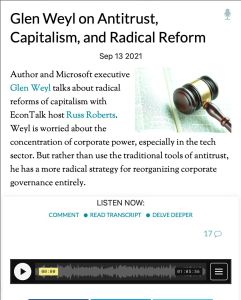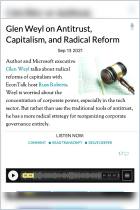Únase a getAbstract para acceder al resumen.

Únase a getAbstract para acceder al resumen.
E. Glen Weyl and Russ Roberts
Glen Weyl on Antitrust, Capitalism, and Radical Reform
EconTalk, 2021
¿De qué se trata?
Policy makers need to reboot antitrust laws for the modern global economy.
Recommendation
US antitrust laws have been a staple of corporate governance since the landmark Sherman Act of 1890. But the 21st century looks far different from the days of the government-mandated break-ups of US Steel and AT&T. Today, technology behemoths like Google, Facebook and Amazon are redefining business models and monopolies. In this fascinating and informative Q&A, EconTalk’s Russ Roberts and Microsoft’s E. Glen Weyl take a deep dive into the nuances of antitrust, capitalism and their impacts on democracy. Anyone concerned about rising monopoly power will find this a valuable discussion.
Summary
About the Speakers
Russ Roberts is the host of EconTalk, a weekly economics podcast. E. Glen Weyl is a political economist and social technologist in Microsoft’s Office of the Chief Technology Officer.























Comment on this summary